
Jacob, A Life Full of Struggle
As we continue our look at Jacob’s life, we will observe that God is beginning to have more of Jac![]() ob’s attention. Jacob is a singularly important personage to the Jewish people, one of the patriarchs of their faith, but he was also human. His parents were faithful followers of the One True God, and Jacob was surely brought up in that tradition. However, he had some tough lesso
ob’s attention. Jacob is a singularly important personage to the Jewish people, one of the patriarchs of their faith, but he was also human. His parents were faithful followers of the One True God, and Jacob was surely brought up in that tradition. However, he had some tough lesso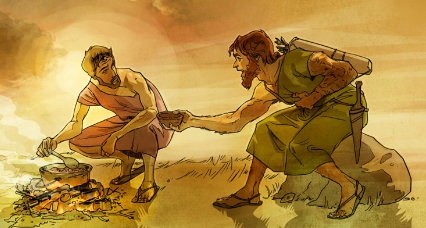 ns to learn, thus the drama in his life continues. We can learn a lot for our own Christian walk from these accounts from Jacob’s journeys. The lessons begin with the life-changing episode disguising himself with Rebekah’s help to trick Isaac into place his birthright blessing. We looked at this episode in our last study session, so our brief review now will be a reminder to fix this event in our mind as the first big turning point in Jacob’s life. The scheme began innocently enough, just a scuffle between two brothers, but the plot indeed thickened. The Bible narrative makes clear the deep emotions that were involved. This family was human just like us. Their faith in God was real, but they let personal agendas and perceived needs of life influence their actions. Just like us today, we don’t go through dramatic life struggles without it impacting how we proceed in life. What do we learn, how are we better, how does the experience leave residual weaknesses to be dealt with later? As we follow Jacob through these next chapters, we will look at four dramatic experiences in his life to see him dealing with these questions and beginning to grow in godly character and close walk with God.
ns to learn, thus the drama in his life continues. We can learn a lot for our own Christian walk from these accounts from Jacob’s journeys. The lessons begin with the life-changing episode disguising himself with Rebekah’s help to trick Isaac into place his birthright blessing. We looked at this episode in our last study session, so our brief review now will be a reminder to fix this event in our mind as the first big turning point in Jacob’s life. The scheme began innocently enough, just a scuffle between two brothers, but the plot indeed thickened. The Bible narrative makes clear the deep emotions that were involved. This family was human just like us. Their faith in God was real, but they let personal agendas and perceived needs of life influence their actions. Just like us today, we don’t go through dramatic life struggles without it impacting how we proceed in life. What do we learn, how are we better, how does the experience leave residual weaknesses to be dealt with later? As we follow Jacob through these next chapters, we will look at four dramatic experiences in his life to see him dealing with these questions and beginning to grow in godly character and close walk with God.
Please pause here and open your Bible and read through Genesis 27-32 in one sitting before you continue on through this Bible Study.

Drama #1 – The Deception of Isaac, Gen. 27:1-40
This is one of the most well-known stories from the Bible, a story filled with anxiety, urgency, secrecy, conspiracy![]() . There is intentional conspiracy between Rebekah and Isaac, as well as between Jacob and Esau. All four are guilty, a tangled web for sure, and all parties suffered emotional trauma as a result. The heightened anxiety caused by what was thought to be Isaac’s impending death was all for nothing, as he lived another 40 years after giving the blessing to Jacob. We started with the “stew negotiation” between Jacob & Esau. Now we read further and we realize that Isaac and Rebekah were both equally guilty with their “birthright conspiracy”. Isaac and Rebekah were both aware of God’s will that the birthright would go to Jacob, but when Isaac engaged Esau to hunt and prepare the stew that he loved, his end game was to jump ahead of the process and give the birthright blessing to Esau. Did he know about the deal Esau had already done with Jacob to give him the birthright? Perhaps. But then we see Rebekah grooming her precious Jacob with her own scheme to manipulate Isaac into giving his blessing to Jacob. We know that God is sovereign in the affairs of man, so He had already
. There is intentional conspiracy between Rebekah and Isaac, as well as between Jacob and Esau. All four are guilty, a tangled web for sure, and all parties suffered emotional trauma as a result. The heightened anxiety caused by what was thought to be Isaac’s impending death was all for nothing, as he lived another 40 years after giving the blessing to Jacob. We started with the “stew negotiation” between Jacob & Esau. Now we read further and we realize that Isaac and Rebekah were both equally guilty with their “birthright conspiracy”. Isaac and Rebekah were both aware of God’s will that the birthright would go to Jacob, but when Isaac engaged Esau to hunt and prepare the stew that he loved, his end game was to jump ahead of the process and give the birthright blessing to Esau. Did he know about the deal Esau had already done with Jacob to give him the birthright? Perhaps. But then we see Rebekah grooming her precious Jacob with her own scheme to manipulate Isaac into giving his blessing to Jacob. We know that God is sovereign in the affairs of man, so He had already 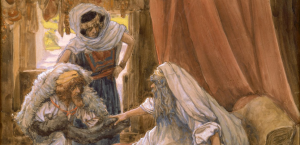 planned that Jacob would receive the birthright. It was to be through Jacob that the line of the promised Seed would come. So why all the human struggle? Primarily, we are all given to seek our own solutions for how to “get what we want”?
planned that Jacob would receive the birthright. It was to be through Jacob that the line of the promised Seed would come. So why all the human struggle? Primarily, we are all given to seek our own solutions for how to “get what we want”?
Gen. 25:29-34 recounts the transfer of the Birthright. In those days, the Birthright gave the receiver a double portion of inheritance from the father, as well being made family chief and priest. It was a prestigious and powerful position. But the brothers engaged in a negotiated transaction that attempted to divert the norm. Jacob knew how “lowly” Esau desired to have the birthright. Note later in the Bible, Esau is called immoral and godless (Heb. 12:16). In Gen. 27:42-47, after receiving Isaac’s blessing and his father’s death, Jacob took Rebekah’s advice and sought to put distance between himself and Esau, so off hegoes to Haran to find a wife. Thus began a twenty-year sojourn from the Promised Land. He likely held tightly to God’s promises as expressed in Isaac’s blessing, and was strengthened by God’s dealings with him along the way, but his faithfulness to God was going to be tested strongly.
Drama #2 – Jacob’s Dream of the Heavenly Ladder, Gen. 27:41-28:12
In Gen. 28:1-5, along with Gen. 27:42-46, we see Jacob’s parents seeing guiding him to put distance between him and Esau. The scene with Isaac encouraging Jacob to launch out reminds us of today’s father as he sends his son or daughter out the door, suitcase in hand and off to college. No father is perfect, Isaac certainly wasn’t, but he was a faithful believer in Jehovah. This passage shows Isaac in his best light as he confirms the birthright blessing to Jacob and encourages him to “do right” in his life, beginning with finding a God-honoring wife in the homeland of Haran. It is interesting to compare Gen. 48:14-19, where Isaac still alive late in life, as he is able to pronounce blessings on Jacob’s grown sons.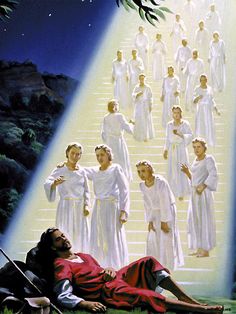
Gen. 28:10-22, Jacob begins his trip from Canaan to Haran. At Bethel, God reveals Himself personally for the first time to Jacob, as he is leaving Canaan. Tired from his journey (remember, he’s the homebody, not the adventurer), he falls asleep with his head resting on a rock. While somewhat baffling to think he chose a rock for a pillow, it could be that God guided him to do that because the next morning he would use it to set up an altar of worship to the Lord. While sleeping, he had a dream about a ladder or stairs that reached all the way to heaven. There is a beautiful depiction of God’s care for His people as His ministering angels traverse up and down the steps carrying out the work of God on Earth. At the top, the Lord appeared to Jacob and confirmed the promises of the Abrahamic covenant of Land, Seed and Blessing (Gen. 28:13-16). Jacob is encouraged in this vision to know God’s promises will prevail, and He will watch over him in his travels. God reminds Jacob of this event later as a confirmation that he should return to Canaan (Gen. 31:13) and Jacob mentions the event to his family (Gen. 35:3). At Bethel, Jacob has the first of two strategic experiences with his God. The Lord seeks Jacob out to provide him guidance, the vision is an act of God’s grace. The experience is concluded with Jacob’s joyous worship (“How awesome is this place!”, Gen. 28:17) , then his solemn worship and vow (Gen. 28:20-22). God’s review of the covenant promises occurs several times in the Bible, but in this passage the review is the most similar to the original revelation to Abraham in Gen. 13. He assured Jacob that He was with him, He assured him of His blessing and protection. When he awakes, he erects a pillar of worship and dedication before he continues his journey and names the place “Bethel”. God’s promise that He would always be with Jacob surely served to be an anchor for Jacob’s rocky life. In his vow, he declares his settled faith in God, recognizes the anticipated protection and final deliverance back in Canaan – interesting that he still feels the need to “negotiate”, saying “if…” (Gen. 28:20) — we are all so desperately human!
Bethel means “house of God”, a reference to His dwelling place, emphasizing how the believer is privileged to be at home with Him. What a great thought, that we as believers should anticipate dwelling in God’s presence as we walk with the Lord. This promise from the Lord to be “with” his servant is new in the Bible, Jacob is only the second person to hear this promise. It is a special confidence which God has continued to give to His faithful followers down through the centuries and continues today.
Drama #3 – Jacob & Laban, Gen. 29-31
In Gen. 29:1, Jacob arrives in Haran and discovers Rachel, a beautiful, godly young woman. Then, alas, he also encounters her father Laban, Rachel’s brother, who is a master manipulator, a trait which runs deep in this family. Laban knew Leah would struggle to attract a man, so he tricked Jacob into marrying her first, then negotiated for him to marry Rebekah also. The catch was the seven years of labor which Jacob had to do for each! Frustration and struggle became a normal part of his family life, by his own doing, then from his wives, and later through his sons.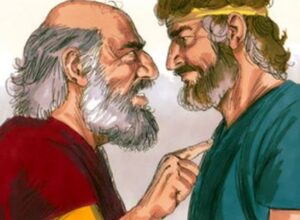 Gen. 29:31-30:24, the wives struggle with being unloved and barren. Leah began the saga by bearing sons while Rachel was barren and watched on the sidelines. She finally resorted to Sarah’s approach and had Jacob bear sons through a servant, after which Leah does the same thing – it was really a sad state of affairs.
Gen. 29:31-30:24, the wives struggle with being unloved and barren. Leah began the saga by bearing sons while Rachel was barren and watched on the sidelines. She finally resorted to Sarah’s approach and had Jacob bear sons through a servant, after which Leah does the same thing – it was really a sad state of affairs.
Gen. 30:25-31:55, Jacob’s relationship with Laban finally comes to a breaking point, Jacob likely realized that the endless spiral of manipulation wasn’t going to lead to God accomplishing His blessing in his life. Jacob ends up getting the “winning hand” by being led by God to make the right choice of flocks. When he finally flees away from Laban’s control, God was able to speak to him (Gen. 31:3) with the command to return to Canaan. After the issues related to Rachel stealing idols from Laban was resolved, they made a covenant and Jacob headed for Canaan.
Drama #4 – Jacob Wrestles with God, Gen. 32
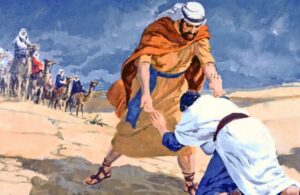 This major drama, probably the turning point in Jacob’s spiritual life as God renames him “Israel”, is prefaced by “the drama that wasn’t” regarding Esau. In Gen. 32:1-21, Jacob has begun his journey away from Laban back to Canaan. Twenty years earlier he had fled away from his brother Esau, now he was fleeing Laban and approaching Mt. Seir where Esau lived – they would have to meet. The history of offenses between them would have to be faced, and Jacob feared the worst. After messages are exchanged, Jacob sets up camp for the night. Although he faced fearful prospects in meeting Esau, he saw the “angels of God” (think back to the ministering angels on the Ladder in Gen. 28:10-15), his camp was “God’s Camp”. Then in Gen. 32:9-12, he goes before God in prayer, claiming God’s covenantal promises, acknowledging his fears and c
This major drama, probably the turning point in Jacob’s spiritual life as God renames him “Israel”, is prefaced by “the drama that wasn’t” regarding Esau. In Gen. 32:1-21, Jacob has begun his journey away from Laban back to Canaan. Twenty years earlier he had fled away from his brother Esau, now he was fleeing Laban and approaching Mt. Seir where Esau lived – they would have to meet. The history of offenses between them would have to be faced, and Jacob feared the worst. After messages are exchanged, Jacob sets up camp for the night. Although he faced fearful prospects in meeting Esau, he saw the “angels of God” (think back to the ministering angels on the Ladder in Gen. 28:10-15), his camp was “God’s Camp”. Then in Gen. 32:9-12, he goes before God in prayer, claiming God’s covenantal promises, acknowledging his fears and c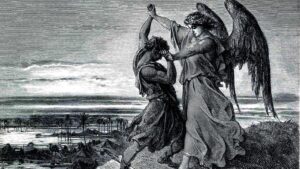 laiming God’s promise of protection. He then sent a large gift of animals as what he thought needed to be an appeasement to Esau.
laiming God’s promise of protection. He then sent a large gift of animals as what he thought needed to be an appeasement to Esau.
Gen. 32:22-32 – Jacob sent his wives and family on over the Jabbok brook which would connect to the Jordan River and on into Canaan. He settles down in camp to sleep, but then is awakened by the Angel of the Lord, an appearance of the Second Person of the Godhead, Jesus Christ (Hosea 12:4). Jacob, 97 years old, “wrestles” with the Lord all night. The struggle ends with the Lord touching Jacob’s hip, putting it out of joint, an injury that would last the rest of his life as a memorial of this event. The famous quote in Gen. 32:26 resonates with us as Christians to this day, “I will not let You go unless You bless me!” He didn’t do well in the match, and ended up with an injured hip. Then Jacob named the place where this occurred “Peniel”, saying “I have seen God face to face.” Jacob’s original name would have been a reminder of shallow manipulating history, meaning “to follow after, supplanter”. God changed his name to Israel, lit. “he will rule as God”, “a prince with God”. It was not Jacob’s wrestling ability that was rewarded, but his tenacious dependence upon God (Constable). This is one of four times God appears to Jacob – Gen. 28:10-22; 32:22-31; 35:9-13; 46:24.
![]() Bible Study Journal
Bible Study Journal
-
-
-
- Since God had already revealed that Jacob would be the Seed to receive Isaac’s birthright and blessing, why does God allow the family’s manipulative actions to proceed? What do we learn from this?
- How do you see Jacob maturing in godliness as he encounters and deals with Laban?
- Before Gen. 32:9-12, what was doing wrong? Then in these verses, what did he do right?
- From Gen. 33:1-17, what did Jacob do wrong with his brother Esau, and what did he do right?
- Why were the encounters with the angels, God Himself, and Esau so important in Jacob’s life?
- Why did God change Jacob’s name?
-
-




